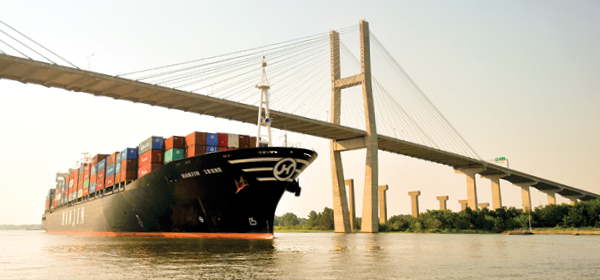Articles
Sponsored

Managing Shipment Data to Meet Customs Requirements
Q: How are Customs agencies changing their approach to reviewing transactional data, and how will this affect shipments and traders? A: Collaborative Border Management (CBM) between Customs agencies will allow countries to exchange trader and shipment data in a live environment so non-compliance and perceived threats can be readily identified, measured, and monitored. Customs is […]
Read More
Alaska: Logistics at the Global Crossroads
Shipments moving to, from, and through Alaska connect the state’s businesses and residents to the rest of the world.
Read More
Building an Effective Import Compliance Program
Q: How do shippers create an importing program? A: Meeting import control obligations need not be a painful experience. Proactive import compliance planning and governance will minimize the risks and negative consequences of non-compliance. First, understand current import laws and regulations. Familiarize yourself with government policies and procedures prior to actually importing your goods. You […]
Read More
Best Practices to Manage International Freight Spend
Many companies have switched operations to low cost suppliers—only to find that higher than expected transportation expenses outweighed the benefits. In fact, the logistics costs associated with operating a global supply chain can be 6 to 11 percent of revenue, roughly three to five times more than a domestic supply network. A recent AberdeenGroup report, […]
Read More
How Freight Classification Changes Impact Shippers
Q: What are some of the recent and proposed changes to the National Motor Freight Classification (NMFC) used to determine the class for rating less-than-truckload (LTL) shipments? A: The most notable change—effective Dec. 1, 2012—was in classifying computer equipment. Under the new classification, this product type moved to a density-based rating with the lowest possible […]
Read More
Georgia: Logistics Front and Center
A prime geographic location positions businesses in Georgia to take the lead.
Read More
e-Commerce: Finding the Sweet Spot
Online retailers seeking new DC and warehouse sites need transportation infrastructure and other resources to support a constant, rapid-fire flow of shipments.
Read More
Connectivity-Visibility-Optimization: Three Keys To a Successful Supply Chain Trading Partner Network
2013 has been called the Year of the Network by numerous supply chain and transportation industry thought leaders. A well-oiled trading partner network allows one-to-many and many-to-many partners to collaborate and communicate using a single source of truth garnered from real-time information. Harnessing this collective power provides a competitive advantage as well as the flexibility […]
Read More
The Lean Supply Chain: A Field of Opportunity
Businesses all around the world are familiar with the value of lean principles. The current conditions of globalization and competitive environments require operating a lean business now more than ever. Lean principles teach to eliminate waste and focus only on those things that result in customer value—ultimately building business cultures that focus on problem solving. […]
Read More
Outsourcing for Newbies, and a Refresher for All
While Fortune 500 companies routinely outsource everything from distribution centers and transportation management to packaging, freight audit/payment and other functions, your up-and-coming company may only need to outsource a single function of its operations, perhaps a combination. It’s rarely an easy decision process, but the objective is always clear. Growing companies need access to better […]
Read More
Using Strategic Acquisitions to Satisfy Your Customer Base
Global shippers continue to face supply chain challenges that seem to change more often and more dramatically than ever before. They require logistics partners who can react to these changes and help them navigate the complexities of global trade. Shippers want 3PL partners that not only responsively evolve service networks and capabilities to flex with […]
Read More
Connecting Through an Online Network Gives Supply Chain Partners Strength in Numbers
Q: What is the Real Time Value Network, and what differentiates it from traditional technologies? A: The Real Time Value Network is a cloud-based "many-to-many" network platform that enables a virtually unlimited number of trading partners to plan, execute, monitor, optimize, and synchronize in real time all of the business processes and events that take […]
Read More
Ports and Shippers Prepare for the Post-Panamax Age
Q: What are the key issues shaping the future of maritime trade? A: One of the greatest opportunities coming to the maritime sector is the widening of the Panama Canal, which will be completed in 2015. It will impact the face of global commerce, and affect trade patterns to the U.S. East Coast. Shippers bringing […]
Read More
Weaving a New, Strong North American Presence
Geodis Wilson helps fashion powerhouse Desigual establish its U.S. operations and ensure the latest fashions are immediately delivered.
Read More
A Window of Opportunity
Window and door maker Simonton Windows partners with Cardinal Logistics to open the door to new efficiencies
Read More
Kentucky: Racing Toward Logistics Leadership
Kentucky is building America’s future with its technological savvy, good jobs, hard work, and a government focused on making the most of the state’s logistics assets.
Read More
How to Find Savings Through Landed Cost Analysis
As shippers adapt sourcing strategies to build redundancy, economy, and responsiveness into their supply chains, the complexity of drilling down total landed costs increases. Shippers often focus resources and attention on procurement, looking only at production and logistics spend. At a more granular level, a myriad of other factors can impact the total supply chain […]
Read More
How to Manage the Supply Chain Following a Natural Disaster
Planning for supply chain exceptions is increasingly an expectation for risk-sensitive shippers. The last decade has unleashed a flood of global weather disasters, from Hurricanes Sandy and Katrina to the eruption of Iceland’s Eyjafjallajokull volcano to the earthquake and tsunami in Japan. Each has impacted business operations in different ways. Failing to properly react to […]
Read More
How to Make Driver Recruitment a Competitive Differentiator
One challenge the logistics sector faces is, well, finding new faces. While the U.S. recession largely suppressed a dormant truck driver shortage, the prospects of economic recovery are stirring old concerns. Adding to the problem, recent government mandates including the Federal Motor Carrier Safety Administration’s Hours of Service and Compliance, Safety, Accountability rules threaten to […]
Read More
How to Move Freight in Volatile Locations
Despite geopolitical upheaval, natural disasters, labor strife, war, and countless other disturbances that threaten supply chain efficiency and economy, freight still needs to move. From delivering humanitarian aid in hurricane-ravaged locations to managing mission-critical parts replenishment in remote areas and delivering heavy equipment in support of government operations, shippers need to be flexible and responsive […]
Read More